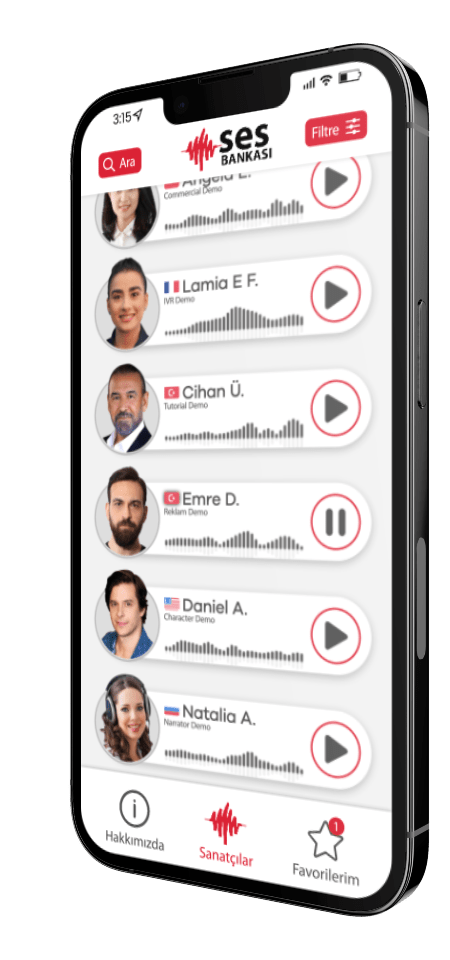Known True Known Mistakes About Dubbing
Most people in the media production industry know and think the same thing for dubbing. However, even if dubbing and dubbing seem to refer to the same job professionally, this is completely wrong. Somehow, we think that it is a habit of mouth caused by the misuse of people who are foreign to the sector. So what exactly is the definition of dubbing and dubbing? How to use? If you wish, let's start by defining the terms of these two sectors.
What are the Differences Between Dubbing?
Voice Over: It is the vocalization of the texts that make up the visual or auditory content made for promotional, narrator and advertising purposes by a voice actor within certain rules (diction, emphasis, intonation, etc.) and recording them in the studio environment. used in the industrydubbingThe meaning of the word 'is to voice the written text for the brand product and service. Dubbing; advertisement film, promotional film, switchboard systems, radio and television advertisements, closed-circuit system announcements, etc. It is the service needed in such projects and is used in these channels.
Dubbing: It is the name of the process of re-speaking the characters in a different language or in the same language in projects such as movies, TV series and documentaries. Dubbing artists are also called microphone players. It is the re-recording of the character with similar expressions and attitude by giving facial expressions to the character he is speaking with. While dubbing is important in the same language, lip sync is not important in a different language. The dubbing artist must have certain theatrical abilities. It does not require any other set of rules.
Let's explain this with a simple true-false clause:
-
- Wrong: Voiceovers are only for animated movies or cartoons.
That's right: Voice acting isn't just limited to animated movies or cartoons. Dubbing is used for commercials, documentaries, video games, educational materials, radio programs and many more media content.
- Wrong: Voiceovers are only for animated movies or cartoons.
-
- Myth: Anyone can be a good voice actor
Correct: good voice actor It takes certain skills to be. Professional training and development of skills such as voice control, using correct emphasis and intonation, and being able to convey text in a natural and expressive way are required.
- Myth: Anyone can be a good voice actor
-
- Myth: Every agency has a soundbank.
That's right: No, not every agency has a soundbank. Voice Bank The term belongs to BiberSA Production and it is Turkey's largest sound bank with tens of thousands of voice actors and dubbing artists.
- Myth: Every agency has a soundbank.
-
- Myth: Dubbing is a complete replacement of the original sound.
That's right: Dubbing is a process in which the original sound is preserved and translated into other languages as appropriate for one language or region. The goal is to make the audience understand the story and the characters. It is dubbed keeping the spirit and emotion of the original performance.
- Myth: Dubbing is a complete replacement of the original sound.
-
- Wrong: Dubbing can be done in any language in the same time.
That's right: The structure of the language and the rate of speech vary between different languages. Therefore, different times may be required for dubbing a text in different languages. When dubbing, it is important to preserve the duration of the text and the flow of the original performance.
- Wrong: Dubbing can be done in any language in the same time.
-
- Myth: Watching in the original language is always the best option.
TRUE: Dubbing and dubbing breaks down a language barrier, allowing access to a wider audience. By watching movies or content in their mother tongue, the audience has the chance to better understand and establish emotional bonds. Therefore, dubbing or dubbing content may be preferred.
- Myth: Watching in the original language is always the best option.
-
- Incorrect: Dubbing and dubbing only includes dialogue.
That's right: Dubbing and dubbing can include different audio elements, such as descriptions, narrator's voice, songs, credits, as well as dialogue. This is a work done to give the viewer a complete experience.
- Incorrect: Dubbing and dubbing only includes dialogue.
Urban Legends About Dubbing Artists
We explained the difference between dubbing and dubbing. Of course, people who practice these two professions are also called by different names and have different abilities.
Voiceover artists give voice to the texts written for the brand product and service, while dubbing artists speak the characters. You are voicing content that has no sound. Content with sound does not need sound anyway. You talk to those characters again. The media production industry has its own jargon, and this jargon is important. The phrase 'I want to have a commercial dubbing' used in the industry is misused. The correct expression is 'I want to have an advertisement voice-over'. Or, 'I want to create a movie dubbing cast' would be a more accurate statement instead of 'I want to create a movie dubbing cast'. Like this, the person who says 'I am a voice actor' can be thought of as a vocal person who is likely to sing, but instead, the expression 'I am a voice artist' describes the person who sings better.
There are many myths that people who are far from the voice-over world know as true. Here are some of these mistakes:
- It's always the same people doing the voiceovers.
Not quite so. There is more diversity now than ever before. With the growing new interest in different voices, more and more artists are now making money off of it.
- I don't live in a big city, so I don't have a chance to be a voice actor.
In fact, the opportunities have never been as plentiful as they are today. Thanks to the advanced technology that is on everyone's desktop and even in their pockets, it is now very easy to voice over from all over the world. Of course, if you know how to use it.
- Voice agencies aren't looking for new talent, so it's impossible for me to show up.
This is not true. We are always on the lookout for new talents; because the entertainment world always needs new sounds and interpretations. Having a good voice doesn't make you a voice actor. The first step for you to learn and improve the voice-over technique will be to meet with a voice-over course. After a certain education and experience, you can apply to a voice-over and dubbing agency and show yourself there first.
- Voice actors earn a lot of money.
This is not true. Every voice actor has a stamp price. The stamp price is determined by the popularity of the voice actor. Here, savings are made by the manager, agency or directly by the artist, taking into account the decisive market conditions. Don't worry, no one bought an apartment with a commercial voiceover.



















